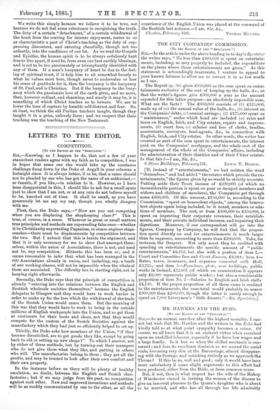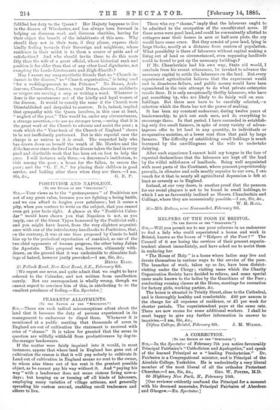MR. HAWKES AND THE ECHO.
pro THE ELIT011 OF TUE "SPECTATOR."] Si;t,—As an earnest searcher after the highest morality, I cannot but wish that Mr. Hawkes and the writers in the Echo had kindly told us at what point sympathy becomes a crime. Of course, we all know that it is an eminent virtue when exercised upon an unskilled labourer, especially if he have low wages and a large family. Is it less so when the skilled mechanic is concerned ; and does its excellence diminish as we ascend the social scale, becoming very dim at the Baronetage, almost disappearing with the Peerage, and vanishing entirely as we approach the Throne ? If this be so, well and good ; only it would have been more satisfactory if some slight arguments to this effect had been produced, either from the Bible, or from common-sense.
But, if not, then in what respect has the wife of the Bishop of Winchester sinned in inviting the women of the diocese to give an innocent pleasure to the Queen's daughter who is about to be married, and who has all through her life admirably
fulfilled her duty to the Queen ? Her Majesty happens to live in the diocese of Winchester, and has always been forward in helping on diocesan work and diocesan charities, having for their object the benefit of the inhabitants of this area. Why should they not in their turn, if they please, express their kindly feeling towards their Sovereign and neighbour, whose residence in their midst is to them a source of pride and of satisfaction ? And who should invite them to do this more fitly than the wife of a great official, whose historical rank and position is far older than that of any other local dignitaries, not excepting the Lords-Lieutenants and High-Sheriffs ?
May I assure my unsympathetic friends that no " Church influence in the diocese," no " Chureh organisation," is being used " for a wedding-present to the Princess." No Deans, Archdeacons, Chancellors, Canons, rural Deans, diocesan architects or vergers are moving a step or writing a word. Whatever is done is the spontaneous act of the kindly and loyal women of the diocese. It would be exactly the same if the Church were Disestablished and despoiled to-morrow. It is, indeed, implied that sympathy with the Queen involves, in this case at least, " neglect of the poor." This would be, under any circumstances, a strange assertion,—to use no stronger term,—seeing that it is the great work of the Church to educate and assist the poor ; a work which the " Year-book of the Church of England " shows to be not inefficiently performed. But in this especial case the charge is as untrue as it is cruel. The respected lady who has drawn down on herself the wrath of Mr. Hawkes and the Echo has ever• since she lived in the diocese taken the lead in every good and charitable work that has been set on foot to help the poor. I will instance only three.—a deaconess's institution, to visit among the poor ; a home for the fallen, to rescue the poor ; and the " G. F. S.," for placing their children in good service, and looking after them when they are there.—I am,
Sir, &c., G. R. P.



































 Previous page
Previous page